|
Sunday:
February 27, 2000 | |
0500 GMT |
 |
Safety of a Pacific island delays U.S. rocket launch
The U.S. Air Force has grounded a Taurus rocket slated for launch Monday after the Tahitian government voiced concerns about the safety of a South Pacific island where part of the booster might land.
FULL STORY
 |  |

|
 |
EchoStar plans 3 new TV satellites for DISH Network
EchoStar Communications Corp. has announced the commencement of construction of three new state-of-the-art satellites designed to offer the latest technology and unparalleled choice to DISH Network subscribers across the U.S.
FULL STORY
 |  |

|
 |
Problem halts X-38 test
The third drop test of the X-38 vehicle 132 was scrubbed on Saturday at NASA's Dryden Flight Research Center, Calif. Officials aborted the mission at 1604 GMT, after the B-52 carrier jet was in flight, due to internal X-38 instrumentation problem that could not be fixed while airborne. After troubleshooting back on the ground, the test was called off for the day 90 minutes later. NASA is developing the X-38 as a crew return vehicle for the International Space Station.
 |  |

|
 |
|
Saturday:
February 26, 2000 | |
0400 GMT |
 |
Shuttle experiment models planetary atmospheres
NASA's "planet in a test tube" experiment has shown that microgravity helps scientists create more accurate models of planetary atmospheres and oceans. Scientists recently published results from this space shuttle experiment.
FULL STORY
 |  |
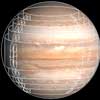
|
 |
Galileo probe put in safe mode after computer glitch
A computer reset placed NASA's Galileo space probe in a "standby mode" while relaying images and data from this week's Io flyby.
FULL STORY
 |  |

|
 |
DAILY BRIEFING Other stories making news today
|
 |
Stardust status report Read about the week that was aboard NASA's comet-bound Stardust space probe, including details on deployment of the craft's interstellar dust collector.
|
 |
NEWSWIRE Links to news across the internet
|
 |
Beijing gaining momentum in project to launch mumans into space -- (L.A. Times) Get ready for the taikonauts. Foreign and domestic scholars believe that a manned Chinese space mission could be launched as early as the end of this year or the first half of 2001, pending a few more test runs.

Senate puts condition on space station aid -- (The Washington Post) The Senate voted unanimously Thursday to require President Clinton to certify that Russia's space agency has not aided Iran's missile program before the United States can help pay for Russia's contribution to the international space station.
|
 |
|
Friday:
February 25, 2000 | |
0330 GMT |
 |
NEAR spacecraft moves closer to asteroid
A brief engine firing Thursday nudged the Near Earth Asteroid Rendezvous (NEAR) space probe ever closer to 433 Eros, a rock the craft began orbiting last week.
FULL STORY
 |  |
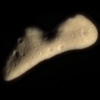
|
 |
Landing strip selected for Japan's HOPE-X spaceplane
The National Space Development Agency of Japan (NASDA) has reached
an agreement with the Republic of Kiribati to prepare and use the Christmas Island as a landing facility for the H-2 Orbiting Plane-Experimental, or HOPE-X.
FULL STORY
 |  |
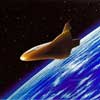
|
 |
International Space Station to undergo maintenance
The orbiting International Space Station awaits the arrival of a space shuttle crew to perform maintenance tasks in April while delivering logistics and supplies for use by future astronaut crews.
FULL STORY
 |  |

|
 |
NEWSWIRE Links to news across the internet
|
 |
Leaky Sun threatens disruption -- (BBC) Space weather forecasters have warned that gusts of solar wind could disrupt satellite operations and power grids until the end of February.

Mir movie set for lift-off -- (BBC) Russian movie actor Vladimir Steklov is confident he will soon be making cinematic history by starring in a thriller aboard the Mir space station.

Student accused of hacking NASA, Defense Dept. -- (The Boston Globe) In what prosecutors are calling a classic cybercrime - hacking into government computers not so much for information as for the sheer thrill of exposing chinks in so-called secure systems - a Northeastern University student was charged yesterday with illegally penetrating sites controlled by NASA and the US Department of Defense.
|
 |
|
Thursday:
February 24, 2000 | |
0506 GMT |
 |
Stardust raises hand to catch interstellar dust
NASA's Stardust spacecraft has successfully deployed its aerogel collector,
enabling it to begin collecting interstellar dust from a stream of
particles that flows through our solar system.
FULL STORY
 |  |

|
 |
Camera sees giant Hughes satellite deploying its wings
For the first time from space, video images have been captured of a commercial satellite unfolding its purple-hued solar wings in orbit more than 22,000 miles above Earth.
FULL STORY
 |  |

|
 |
Endeavour astronauts 'pleased' with mission
The six international astronauts that spent 11 days mapping the Earth with radar aboard shuttle Endeavour say they give an "A+" for their mission's results.
MISSION STATUS CENTER
 |  |

|
 |
DAILY BRIEFING Other stories making news today
|
 |
Dryden F-18s fly airborne astronomy experiment Flight research at NASA's Dryden Flight Research Center, Edwards, Calif., took on a new dimension recently when two of the center's high-performance F-18 mission support aircraft served as flying observatories for an astronomical occultation experiment.
|
 |
|
Wednesday:
February 23, 2000 | |
1550 GMT |
 |
Endeavour cruises home after mapping planet Earth
Space shuttle Endeavour gracefully glided to a safe landing on Tuesday with a spectacular Florida sunset as a backdrop. With commander Kevin Kregel at the controls, the shuttle touched down at 2322 GMT at Kennedy Space Center.
FULL STORY
MISSION STATUS CENTER
LANDING VIDEO [235k, 26sec QuickTime file]
 |  |
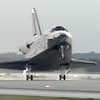
|
 |
Galileo probe makes third and closest Io flyby
NASA's Galileo spacecraft has scored another success by completing Tuesday morning's third and closest flyby of Jupiter's volcanic moon Io, dipping to only 124 miles above the fiery surface.
FULL STORY
 |  |
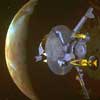
|
 |
NEWSWIRE Links to news across the internet
|
 |
Boeing overruns on space station near $1 billion -- (L.A. Times) Boeing Co. will forfeit most of its potential profit from the International Space Station because of almost $1 billion in cost overruns, the National Aeronautics and Space Administration inspector general said. The aerospace giant will receive about $75.4 million of the $203 million it could have earned for keeping within budget.

Armstrong unveils century's top engineering feats -- (Reuters/Yahoo!) Neil Armstrong, the first man on the Moon and a self-described "nerdy engineer," said on Tuesday his astronomic feat does not even rank among the top 10 engineering achievements of the 20th century.
|
 |
|
Tuesday:
February 22, 2000 | |
2205 GMT |
 |
Endeavour landing could be thwarted by bad weather
Space shuttle Endeavour's astronauts are setting their sights on returning to Earth today after mapping a vast majority of the planet, but where the shuttle lands in anyone's guess. See our Mission Status Center for live landing updates.
FULL STORY
MISSION STATUS CENTER
 |  |
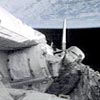
|
 |
Next shuttle mission becomes two flights
As space shuttle Endeavour nears its homecoming on Tuesday, NASA officials have formally approved plans to split the next mission to the International Space Station into two voyages of Atlantis.
FULL STORY
 |  |

|
 |
Galileo swings by Io
NASA's Galileo spacecraft survived a close flyby of Jupiter's fiery moon Io today, the most volcanic body in the solar system. Controllers report no problems occurred during the encounter.
EARLIER STORY
 |  |
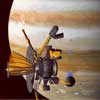
|
 |
Happy Birthday Stardust!
The Stardust spacecraft blasted into space a year ago. Its destination - Comet Wild 2. Its mission -- to capture interstellar and comet particles before returning to Earth in 2006. Over the past year, the ship and its "sailors" have learned to voyage on the ocean of deep space.
FULL STORY
 |  |

|
 |
DAILY BRIEFING Other stories making news today
|
 |
Chandra reads cosmic bar code of gas around black hole -- Astronomers have used NASA's Chandra X-ray Observatory to make an energy bar code of hot gas in the vicinity of a giant black hole. These measurements, the most precise of their kind ever made with an X-ray telescope, demonstrate the existence of a blanket of warm gas that is expanding rapidly away from the black hole.

Newfound quasar wins title 'most distant in the universe' -- If Guinness had a Book of Cosmic Records, a newly discovered quasar in the constellation Cetus would make the front page. This distant quasar easily skates past the previous record-holder,
placing it among the earliest known structures ever to form in the Universe.

Rosetta model 'all shook up' -- The test programme of the Rosetta Structural Thermal Model (STM) continues to go with a bang. At the end of last week, the STM underwent a series of shocking experiences in order to check its ability to survive the rough treatment that will be meted out during launch.
|
 |
|
Monday:
February 21, 2000 | |
1611 GMT |
 |
Shuttle radar mast finally retracted after problem
Endeavour's 197-foot long radar antenna mast was finally latched into its canister today after several attempts. The glitch caused two hours of drama for the astronauts and Mission Control. The giant boom finished its Earth mapping work earlier this morning. See our Mission Status Center for the latest news.
MISSION STATUS CENTER
 |  |

|
 |
Veteran Galileo ventures to vast volcanic vistas
NASA's Galileo spacecraft is trying to go "three for three" as it attempts its third and closest flyby of Jupiter's fiery moon Io on Tuesday, the most volcanic body in the solar system.
FULL STORY
 |  |

|
 |
Thunderstorms are energy source for Jupiter's spot
Using data from the Galileo spacecraft currently in orbit around Jupiter, scientists have discovered that thunderstorms beneath the upper cloud cover are supplying energy to the planet's colorful large-scale weather patterns, including the 300-year-old Great Red Spot.
FULL STORY
 |  |

|
 |
Eros rendezvous previews Rosetta's rock show
One week after NASA's NEAR satellite achieved a notable 'first' when it entered orbit around a near-Earth asteroid named 433 Eros, scientists are looking ahead to future missions including the European Rosetta space probe.
FULL STORY
 |  |
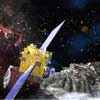
|
 |
NEWSWIRE Links to news across the internet
|
 |
We only have a billion years of beach time left -- (Reuters/Yahoo!) The Earth's oceans are going to dry up and disappear much sooner than anyone thought -- in about a billion years, a researcher said on Sunday. Researchers had predicted that the oceans would boil off in about five billion years when the Sun starts to burn up its fuel and grow bigger, enveloping Mercury and roasting Venus and the Earth.

Thousands crowd new NYC planetarium -- (AP/Yahoo!) Thousands of people flocked Saturday to the opening of The Museum of Natural History's new $210 million planetarium complex, praised for its daring architecture and use of technology to portray a realistic picture of the cosmos.
|
 |
 |

